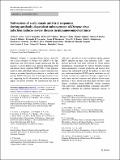Subversion of early innate antiviral responses during antibody-dependent enhancement of Dengue virus infection induces severe disease in immunocompetent mice
Author(s)
Costa, Vivian V.; Fagundes, Caio T.; Valadão, Deborah F.; Ávila, Thiago V.; Cisalpino, Daniel; Rocha, Rebeca F.; Ribeiro, Lucas S.; Ascenção, Fernando R.; Kangussu, Lucas M.; Junior, Celso M. Q.; Astigarraga, Ruiz G.; Gouveia, Frederico L.; Silva, Tarcília A.; Bonaventura, Daniela; de Almeida Sampaio, Divaldo; Leite, Ana Cristina L.; Teixeira, Mauro M.; Souza, Danielle G.; ... Show more Show less
Download430_2014_Article_334.pdf (4.001Mb)
PUBLISHER_POLICY
Publisher Policy
Article is made available in accordance with the publisher's policy and may be subject to US copyright law. Please refer to the publisher's site for terms of use.
Terms of use
Metadata
Show full item recordAbstract
Dengue is a mosquito-borne disease caused by one of four serotypes of Dengue virus (DENV-1–4). Epidemiologic and observational studies demonstrate that the majority of severe dengue cases, dengue hemorrhagic fever and dengue shock syndrome (DHF/DSS), occurs predominantly in either individuals with cross-reactive immunity following a secondary heterologous infection or in infants with primary DENV infections born from dengue-immune mothers, suggesting that B-cell-mediated and antibody responses impact on disease evolution. We demonstrate here that B cells play a pivotal role in host responses against primary DENV infection in mice. After infection, μMT[superscript −/−] mice showed increased viral loads followed by severe disease manifestation characterized by intense thrombocytopenia, hemoconcentration, cytokine production and massive liver damage that culminated in death. In addition, we show that poly and monoclonal anti-DENV-specific antibodies can sufficiently increase viral replication through a suppression of early innate antiviral responses and enhance disease manifestation, so that a mostly non-lethal illness becomes a fatal disease resembling human DHF/DSS. Finally, treatment with intravenous immunoglobulin containing anti-DENV antibodies confirmed the potential enhancing capacity of subneutralizing antibodies to mediate virus infection and replication and induce severe disease manifestation of DENV-infected mice. Thus, our results show that humoral responses unleashed during DENV infections can exert protective or pathological outcomes and provide insight into the pathogenesis of this important human pathogen.
Date issued
2014-04Department
Singapore-MIT Alliance in Research and Technology (SMART)Journal
Medical Microbiology and Immunology
Publisher
Springer Berlin Heidelberg
Citation
Costa, Vivian V. et al. “Subversion of Early Innate Antiviral Responses during Antibody-Dependent Enhancement of Dengue Virus Infection Induces Severe Disease in Immunocompetent Mice.” Medical Microbiology and Immunology 203.4 (2014): 231–250.
Version: Author's final manuscript
ISSN
0300-8584
1432-1831